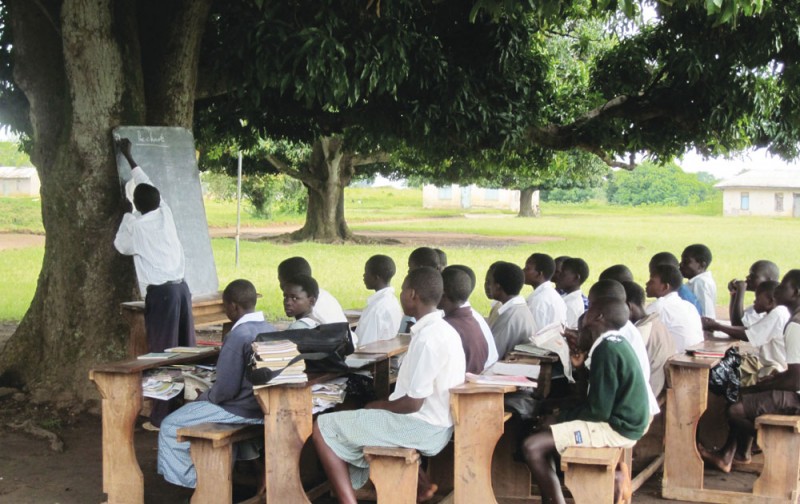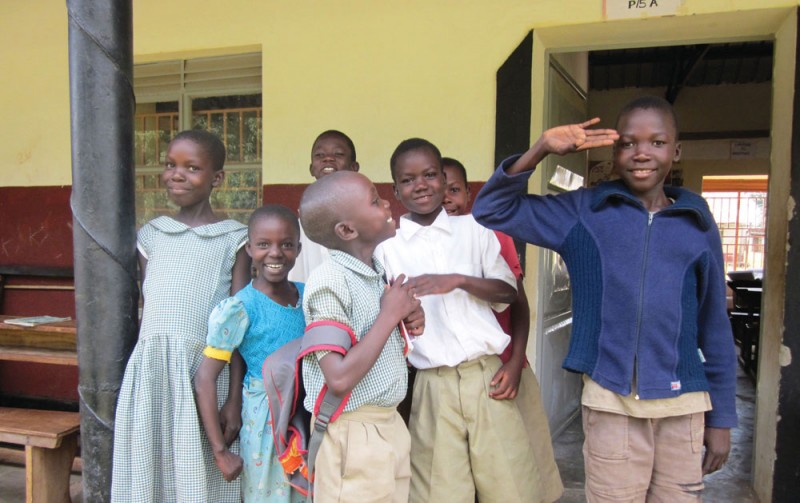UGANDA:
Local Language Instruction Spurs Primary Level Literacy and NumeracyFebruary 23, 2011
 Consider the case of a typical Ugandan rural family with one brother and one sister. If the brother were to be born in 2000 and the sister in 2001, it is highly likely that they were taught in two radically different curricula when they entered lower primary school in, respectively, 2006 and 2007. Prior to 2007, the curriculum for the lower primary section in Uganda was a traditional subject-based curriculum with English as the medium of instruction. However, a range of performance and achievement tests conducted by different agencies demonstrated low levels of pupil performance in the basic skills of reading, writing, comprehension, speaking and number work. For instance the National Assessment of Progress in Education (NAPE) conducted by the Uganda National Examinations Board (UNEB) indicated that in 2006, 45.6% and 42.6% of P3 (equivalent to Grade 3) pupils reached a defined level of literacy and numeracy respectively. Some of the study’s conclusions noted that a primary factor for failure of primary students especially in lower primary to such basic skills lay in teaching practices that were non-child-friendly in nature. The study also found that children were not adapting to English language instruction due to the prevalence of local languages. Accordingly, children who must assimilate to a new language of instruction upon entering primary school are usually at risk of dropping out of school.
Consider the case of a typical Ugandan rural family with one brother and one sister. If the brother were to be born in 2000 and the sister in 2001, it is highly likely that they were taught in two radically different curricula when they entered lower primary school in, respectively, 2006 and 2007. Prior to 2007, the curriculum for the lower primary section in Uganda was a traditional subject-based curriculum with English as the medium of instruction. However, a range of performance and achievement tests conducted by different agencies demonstrated low levels of pupil performance in the basic skills of reading, writing, comprehension, speaking and number work. For instance the National Assessment of Progress in Education (NAPE) conducted by the Uganda National Examinations Board (UNEB) indicated that in 2006, 45.6% and 42.6% of P3 (equivalent to Grade 3) pupils reached a defined level of literacy and numeracy respectively. Some of the study’s conclusions noted that a primary factor for failure of primary students especially in lower primary to such basic skills lay in teaching practices that were non-child-friendly in nature. The study also found that children were not adapting to English language instruction due to the prevalence of local languages. Accordingly, children who must assimilate to a new language of instruction upon entering primary school are usually at risk of dropping out of school.
In response to conclusions reached with the Government-sponsored study, in February 2007, a new primary school curriculum, called the “thematic curriculum” was launched with the assistance of the USAID-funded UNITY project (Ugandan Initiative for TDMS and PIASCY). In collaboration with the Ministry of Education and Sports (MOES), the UNITY project is helping the Government implement this new curriculum, assisting learners to develop not only fluency but also competencies and life skills as a result of instruction in their own local language. Children who master basic literacy and numeracy skills in their mother tongue are better prepared to succeed when English-language instruction begins. UNITY provided technical assistance to the National Curriculum Development Centre to develop the thematic curriculum and is conducting a continuous assessment of this new curriculum whose impacts are being measured through the Measuring Learning Achievement (MLA) assessment. The goal of the MLA assessment is to find out whether the students are demonstrating higher competencies in literacy and numeracy as a result of the introduction of the thematic curriculum.
Designed to improve the quality of basic education, the new curriculum is organized by themes rather than subjects. Children are taught in one of the main official local languages throughout P1 to P3 (equivalent to Grades 1 to 3) in rural areas. In urban areas, English is used as a medium of instruction while local languages are taught as a subject (strands) of the thematic curriculum. The rationale for the use of local language was to enable young children to learn and express their thoughts and ideas in a language that they understand. This allows them to grasp concepts faster and gives them a more solid foundation in literacy, numeracy, and life skills, which will better prepare them for learning more complex things as they move up the educational ladder. Grade 4 or P4 is a transition year during which children switch from a theme-based curriculum to a subject-based curriculum and from the use of a local language as the medium of instruction to English as the dominant one.
The themes were selected based on their relevance to the children’s interests and experience such as “our home and community” and “the human body and health.” Consequently, the new curriculum is rightly advertised as a child-centered approach: the child is at the center of the thematic curriculum. The expected outcomes are that children will improve in literacy, numeracy and life skills. It will make learning concrete and easier as the pupils will be communicating in their local language. Therefore, the thematic curriculum reduces boredom and failure. Basically, says Geoffrey Okello, Deputy Principal at Loro Core Primary Teachers College, “teaching progresses from the known to the unknown. And knowing the local language is the starting point to move forward.”
Conducted by School to School International, a partner of the UNITY project, the MLA research outcomes of 2007 to 2009 showed improvement in literacy and in numeracy from the old curriculum to the new curriculum. For instance, comparison between the P2 (2007) MLA baseline and P2 (2008) follow-up in control and experimental schools showed that schools using local language (experimental schools) as a medium of instruction saw a significant increase in pupil achievement by 9.8% in language and 2% in Mathematics as compared to the control schools that registered a 0% increment in achievement in language and a -2% in Mathematics. The 2009 P3 MLA results showed a 10% mean score improvement in literacy, and a margin of 5% mean score improvement in numeracy, from the old curriculum to the new curriculum. This is a significant improvement in pupil competency which demonstrated the effectiveness of the thematic curriculum. Over the life of UNITY, it is anticipated that the MLA will consist of four rounds of tests. Pupils are tested in literacy and numeracy in English for the baseline and in one of the six following local languages: Acholi, Luganda, Ateso, Runyankole, Rukiga and Lango for the new curriculum. Preliminary results show that the reform is yielding substantial gains in student learning and reading.
UNITY has also helped to provide materials in local languages, as well as professional development, for primary teachers in the thematic curriculum. In 2009, with assistance from the project, P3 local language materials were developed and translated into 11 local languages. In 2010, a total of 230,000 copies of local language materials for P3 were printed and sent to the Primary Teacher Colleges. They will be delivered to the schools at the start of the new academic year in February 2011. Several trainings of P1-P4 teachers in Thematic and Transitional Curricula were also conducted in 2010 and more than 8,000 teachers were trained. UNITY also supports the MOES to adapt the P4 transition curriculum to special needs education.
 Despite its successes, the implementation is constrained by a multitude of structural and short-term challenges. First of all, it shed light on the reality of Ugandan classrooms where, since the introduction of Universal Primary Education (UPE) in 1997, it is easy to find, continues Geoffrey Okello, classes with 200 children that are handled by only one teacher. Given such an environment, the assessment of pupils is a permanent challenge for teachers. Another challenge raised by teachers is the difficulty of translating the curriculum content into local languages. For instance, in Lango, continues Geoffrey Okello, one word is used to describe multiple things. Another recurrent problem is the lack of teaching materials as well as student book learning materials. The UNITY project is supporting the Government of Uganda/MOES to remediate this issue. There are also major misconceptions that have developed about the new curriculum. Local language is just a component of the thematic curriculum. For some parents in the developing world, their children’s success and achievement largely derive from their mastery of English. For such parents, their children should be taught in English and only in English and, receiving instruction in their own native language is tantamount to a regression. This misconception calls for a wide outreach plan to engage the community, address the misconceptions and make sure parents increase their participation and take ownership of the reform.
Despite its successes, the implementation is constrained by a multitude of structural and short-term challenges. First of all, it shed light on the reality of Ugandan classrooms where, since the introduction of Universal Primary Education (UPE) in 1997, it is easy to find, continues Geoffrey Okello, classes with 200 children that are handled by only one teacher. Given such an environment, the assessment of pupils is a permanent challenge for teachers. Another challenge raised by teachers is the difficulty of translating the curriculum content into local languages. For instance, in Lango, continues Geoffrey Okello, one word is used to describe multiple things. Another recurrent problem is the lack of teaching materials as well as student book learning materials. The UNITY project is supporting the Government of Uganda/MOES to remediate this issue. There are also major misconceptions that have developed about the new curriculum. Local language is just a component of the thematic curriculum. For some parents in the developing world, their children’s success and achievement largely derive from their mastery of English. For such parents, their children should be taught in English and only in English and, receiving instruction in their own native language is tantamount to a regression. This misconception calls for a wide outreach plan to engage the community, address the misconceptions and make sure parents increase their participation and take ownership of the reform.
—Roseline F. Tekeu
This article leverages my experience working in the field in Uganda during the month of September 2010. During my stay, I had the opportunity to attend, in Loro Core Primary Teachers College (North Uganda), a training of P1-P4 teachers on the Thematic and Transition Curricula Review.
